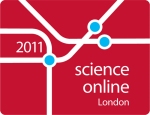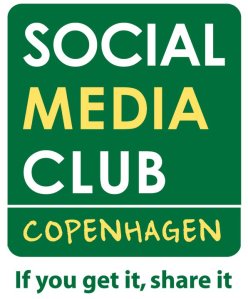My own educational background is interdisciplinary. Public Health is interdisciplinary at its core and adding journalism to it adds a world of not just traditional journalists as we know them from newspapers, radio and television but also communication experts in various forms. Working with social media at Medical Museion in Copenhagen have added a new group of people coming from the world of technology, enthusiast in social media etc. This grand mix of people have all been represented at the different seminars I have been so fortunate to attend over the last couple of months.
Some of the seminars and conferences I have mentioned here previously, but I thought I’d just give a small insight into some of the events I have attended where science communication is discussed directly or indirectly.
London – scientists – social media – enthusiasts – TWITTER

I have already shared some thoughts from my participation at Science Online in London this September in Changed by Science Online London 2011? Thinking back on it the keyword for me from the conference was lots of enthusiastic people. A complete different crowd of people from my previous world. Real scientist eager to share their knowledge and spread the word about the potentials in social media. It was about live-tweeting. Not only about what you heard, but also what it made you think of or how you liked (or disliked) what you heard. ![]() Quite a crash introduction to a new world to me. Can’t wait to joining the “big brother” conference ScienceOnline2012 in North Carolina in January 2012!
Quite a crash introduction to a new world to me. Can’t wait to joining the “big brother” conference ScienceOnline2012 in North Carolina in January 2012!
Crisis communication – Experimentarium – Science Media Centre – UK – Denmark
![]() The Experimentarium (the Danish Science Centre) hosted a conference in October called When Science Meets The Headlines. Participants were a great mix of journalists, communicators, scientists and researchers. The conference was divided into three session. The first session focused on the current situation in Denmark when it comes to researchers/scientists engagement and efficiency in communication to the public. Both journalists, researchers and communicators shared their perspective. Unfortunately, the mention of social media was almost nonexistent – perhaps as a symptom that it is not used, perhaps due to an oversight from the organisers. Second session was a presentation of the English Science Media Center (SMA), an independent venture working to promote the voices, stories and views of the scientific community to the national news media when science is in the headlines. Three speakers from London joined and gave a (over?) positive description of the SMA. Personally, I really missed a more critical perspective and some reflexion on where it might work less well. Third part was then a discussion of the future of science communication in Denmark. Again, it was surprising to see of how little attention was given to the potential in social media. A big shame! It was however clear that the main objective from the organisers side was a promotion of a future Danish Science Media Centre hosted or driven by the Experimentarium. No debate was initiated on who would be most appropriate to host such a centre or whether the needs in Denmark might be different from the UK and therefore require an alternative strategy and organisation. This was a shame. Despite some critic of the conference it was however all in all a very inspirational day with a really good mix of participants.
The Experimentarium (the Danish Science Centre) hosted a conference in October called When Science Meets The Headlines. Participants were a great mix of journalists, communicators, scientists and researchers. The conference was divided into three session. The first session focused on the current situation in Denmark when it comes to researchers/scientists engagement and efficiency in communication to the public. Both journalists, researchers and communicators shared their perspective. Unfortunately, the mention of social media was almost nonexistent – perhaps as a symptom that it is not used, perhaps due to an oversight from the organisers. Second session was a presentation of the English Science Media Center (SMA), an independent venture working to promote the voices, stories and views of the scientific community to the national news media when science is in the headlines. Three speakers from London joined and gave a (over?) positive description of the SMA. Personally, I really missed a more critical perspective and some reflexion on where it might work less well. Third part was then a discussion of the future of science communication in Denmark. Again, it was surprising to see of how little attention was given to the potential in social media. A big shame! It was however clear that the main objective from the organisers side was a promotion of a future Danish Science Media Centre hosted or driven by the Experimentarium. No debate was initiated on who would be most appropriate to host such a centre or whether the needs in Denmark might be different from the UK and therefore require an alternative strategy and organisation. This was a shame. Despite some critic of the conference it was however all in all a very inspirational day with a really good mix of participants.
Google+ – communication officers – Social Media Club
I n October an organisation which I had not heard of before, hosted an afternoon session on the wonders of Google+. The organisation, which calls itself Social Media Club Copenhagen had invited three speakers to share their experiences and knowledge about Google+. I am not sure how many of the participants had a health background, but I definitely felt like a minority group. Instead the room was full of people from the communication office of this and that company, from media organisations and other communicative people. Although only one speaker was actually from Google it felt a little bit like all three of them had been paid to salute Google+. Perhaps their recommendations were very heartfelt and real, but it did just seem like a little bit too fantastic. Despite a seminar where I wasn’t quite sure what I got out of it, it did reawaken a curiosity to this new platform and I took home some useful G+ tips which were shared during and after the seminar. Eg. the ‘Hangout’ features seems to contain lots of potential as useful tool!
n October an organisation which I had not heard of before, hosted an afternoon session on the wonders of Google+. The organisation, which calls itself Social Media Club Copenhagen had invited three speakers to share their experiences and knowledge about Google+. I am not sure how many of the participants had a health background, but I definitely felt like a minority group. Instead the room was full of people from the communication office of this and that company, from media organisations and other communicative people. Although only one speaker was actually from Google it felt a little bit like all three of them had been paid to salute Google+. Perhaps their recommendations were very heartfelt and real, but it did just seem like a little bit too fantastic. Despite a seminar where I wasn’t quite sure what I got out of it, it did reawaken a curiosity to this new platform and I took home some useful G+ tips which were shared during and after the seminar. Eg. the ‘Hangout’ features seems to contain lots of potential as useful tool!
Journalists – social media – drinks – debate

The Copenhagen section of the Danish Union of Journalists have applied a wonderful concept called “Drinks and Debate”. Every last Friday of the month they invite members to meet up at Library Bar in Copenhagen and participate in a debate and enjoy one (sometimes two) free cocktails. In October the theme was what journalism can learn from Social Media. Once again this was not a crowd of health people, but a majority of journalists who for a great part (still) feel threatened by this scary phenomena of social media. Astrig Haug from the Danish media hos Berlingske talked about her experiences with using social media and shared thoughts on Danish media’s adoption (or lack) of social media. Interesting thoughts on how newspapers are still thinking in print articles when writing to the net and the need for the journalist to adapt to a changing world were brought forward. Astrid Haug encouraged journalist to turn their heads towards the bloggers for inspiration both as information sources but also for their methods and style. For example by being better at putting themselves out there and also expose what you don’t know. All in all an inspiring debate.
Mixing it all up and seminars to come
Attending these different seminars and conferences have been very inspiring for me. The quality as varied but all have has contributed to increase my understanding of social media and its current and potential role in communication broadly and in science communication specifically. What I now await is a Public Health conference that could put social media on the agenda. Sadly the upcoming annual of conference European Public Health Association (EUPHA) which takes place in Copenhagen 9-11 November, does not have it on the programme. The social media presence prior to the conference has also been very limited. A hashtag #EPHconference have however been promoted and I’m curious to see whether it will be used. Right now I’m sceptical but hoping to be positive surprised! Later this afternoon I’m heading to a seminar at Videnskab.dk (a Danish science communication website) about the visibility of Danish research and a preview of a new international research platform called ScienceNordic. Will share more about this seminar later on.
A lovely confusing mix of journalists, science communicators, Google+ enthusiasts, communication experts at seminars
My own educational background is interdisciplinary. Public Health is interdisciplinary at its core and adding journalism to it adds a world of not just traditional journalists as we know them from newspapers, radio and television but also communication experts in various forms. Working with social media at Medical Museion in Copenhagen have added a new […]


